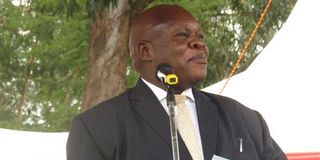Borehole drillers cautioned

Mr Isack Kamwelwe,
What you need to know:
Bico is a consultancy arm of the College of Engineering and Technology at the University of Dar es Salaam.
Tanga. The Bureau for Industrial Cooperation (Bico) has been asked to come up with technologies that would make it possible to ascertain the quality of underground water before drilling starts to save money.
Bico is a consultancy arm of the College of Engineering and Technology at the University of Dar es Salaam.
The request was made by the minister for Water and Irrigation, Mr Isack Kamwelwe, when he visited the bureau’s pavilion at an exhibition of the Association of Tanzania Water Suppliers here over the weekend.
Mr Kamwele pointed out that there are times when the government has for all practical purposes been forced to incur losses after the quality of underground water that was drilled at huge costs was found to be unfit for human consumption.
“I ask you to consider developing some technology to accurately determine the quality of underground water before drilling starts. This will help save taxpayers’ money,” the minister advised.
While at the pavilion, the minister was briefed by a senior lecturer from the Department of Water Resources Engineering of the College of Engineering and Technology, Dr Richard Kimwaga, on an ongoing feasibility study for septic tank sewerage treatment facilities.
This is being done for the Dar es Salaam Water and Sanitation Authority in areas of the nation’s most important metropolis that are with no sewers, and with poor sanitation.
According to Dr Kimwaga, the bureau is developing technology that is intended to ‘process’ sewerage for the production of briquettes for use as fuel.
Bico is a consultancy arm of the College of Engineering and Technology which, according to Dr Kimwaga has the capacity to undertake professional consultancy services and training in different areas, including mining, mechanical, energy, industrial, chemical and process engineering, as well as civil engineering, environmental impact assessment (EIA), electrical engineering and ICT. Regarding water resources engineering, Dr Kimwaga said the bureau is currently involved in such major projects as EIA of the proposed wind power plant in Singida Region, integrated water resources management and development plan for the Pangani River Basin, Lake Victoria new water release policy, and evaluation of climate change impacts on water resources in the Wami River Basin.




